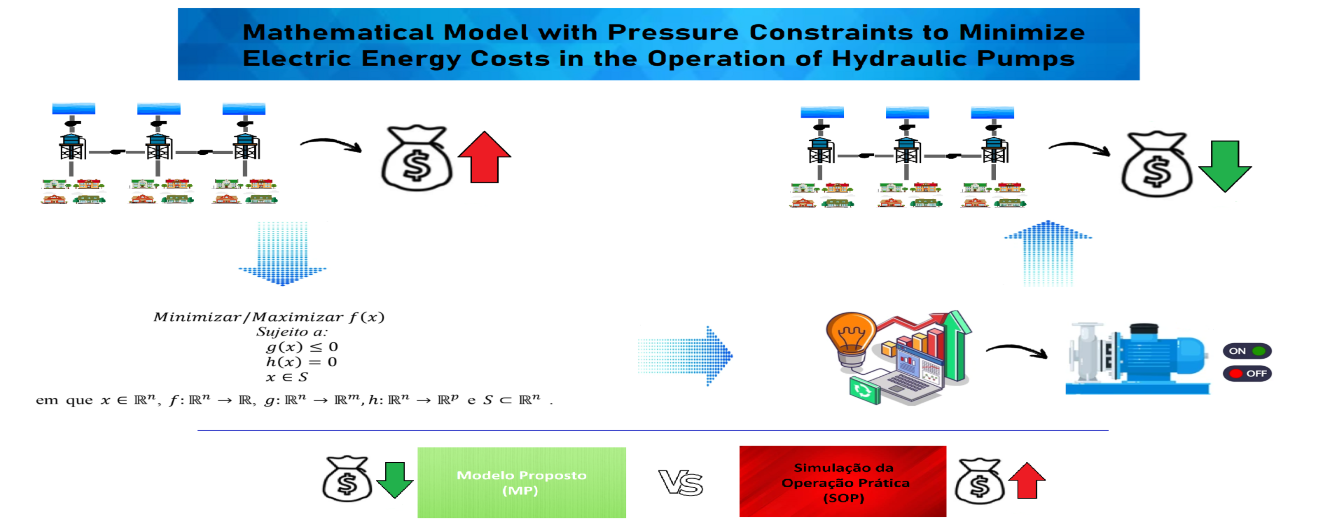Mathematical Model with Pressure Constraints to Minimize Electric Energy Costs in the Operation of Hydraulic Pumps
Keywords:
Electricity, water supply systems, hydraulic pumps, optimizationAbstract
Water supply systems are responsible for providing quality water to the population in sufficient quantity. As sanitation companies are major energy consumers of electrical power, they have a contract of power in which the cost of electricity varies according to the period of the day. Thus, for these companies, at peak times the price of electricity is much higher. Most of the expenditure on electricity in water supply systems is due to hydraulic pumps, which are activated when the level of the tanks reaches the minimum level and remain on until the maximum levels are reached, without taking into account the time where this operation is performed. This work proposes a mathematical model for the optimization of electricity costs in water supply systems through the planning of the operation of hydraulic pumps. Numerical tests were performed through the implementation of the proposed model in GAMS software and solved by the CPLEX optimization package for different demand scenarios, in order to validate the proposed model. A model that simulates the operation performed in the practice of water supply systems is also presented, and its results are compared to the proposed optimization model. The obtained results proof of the efficiency of hydraulic pumps operation planning provided by the proposed model in relation to the operation performed in practice in water supply systems.
Downloads
References
J. D. L. Vega and D. Alem, "Energy rationalization in water supply
networks via stochastic programming," IEEE Lat. Am. Trans., vol. 13,
no. 8, pp. 2742–2756, 2015.
J. Sousa, J. Muranho, A. S. Marques and R. Gomes, "Optimal management
of water distribution networks with simulated annealing: the c-town
problem," Journal of Water Resources Planning and Management, vol.
, no. 5, pp. C4015010, 2016.
M. Likeman, Constraint satisfaction methods in water supply scheduling,
Integrated computer applications in water supply, vol. 1, pp. 213–225,
John Wiley & Sons, Inc., 1994.
A. M. Brdys, Operational control of water systems: structures, algorithms,
and applications, Prentice Hall, 1994.
E. Salomons and M. Housh, "Practical real-time optimization for energy
efficient water distribution systems operation," Journal of Cleaner Production,
vol. 275, pp. 124148, 2020.
W. Chen et al., "Genetic optimization toward operation of water intakesupply
pump stations system," Journal of Cleaner Production, vol. 279,
no. 3, pp. 123573, 2021.
K. James, S. L. Campbell and C. E. Godlove, Watergy: Taking advantage
of untapped energy and water efficiency opportunities in municipal water
systems, Alliance to Save Energy, 2002.
B. Ghaddar et al., "A Lagrangian decomposition approach for the pump
scheduling problem in water networks," European Journal of Operational
Research, vol. 241, n. 2, pp. 490-501, 2015.
K. W. Little and B. J. Mccrodden, "Minimization of raw water pumping
costs using MILP," Journal of Water Resources Planning and Management,
vol. 115, n. 4, pp. 511-522, 1989.
U. Zessler and U. Shamir, "Optimal operation of water distribution
systems," Journal of Water Resources Planning and Management, vol.
, n. 6, pp. 735-752, 1989.
H. Mala-Jetmarova, N. Sultanova and D. Savic, "Lost in optimisation
of water distribution systems? A literature review of system design,"
Environmental Modelling & Software, vol. 93, pp. 209-254, 2017.
J. E. Van Zyl, D. A. Savic and G. A. Walters, "Operational optimization
of water distribution systems using a hybrid genetic algorithm," Journal
of Water Resources Planning and Management, vol. 130, n. 2, pp. 160-
, 2004.
F. Toledo, M. O. dos Santos, M. N. Arenales and P. S. Júnior, "Logística
de distribuição de água em redes urbanas: racionalização energética,"
Pesquisa Operacional, vol. 28, n. 1, pp. 75-91, 2008.
W. Kurek and A. Ostfeld, "Multi-objective optimization of water quality,
pumps operation, and storage sizing of water distribution systems,"
Journal of environmental management, vol. 115, pp. 189-197, 2013.
M. O. dos Santos, E. M. Soler, M. M. Furlan and J. C. M. Vieira, "A
mixed integer programming model and solution method for the operation
of an integrated water supply system", International Transactions in
Operational Research, vol. 29, pp. 929-958, 2022.
B. S. Vieira, S. F. Mayerle, L. M. S. Campos and L. C. Coelho,
"Optimizing drinking water distribution system operations," European
Journal of Operational Research, vol. 280, no. 3, pp. 1035-1050, 2020.
A. D. Bagirov et al., "An algorithm for minimization of pumping costs in
water distribution systems using a novel approach to pump scheduling,"
Mathematical and Computer Modelling, vol. 57, n. 3-4, pp. 873-886,


